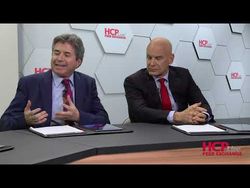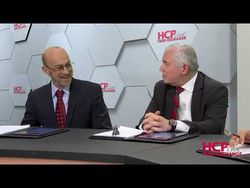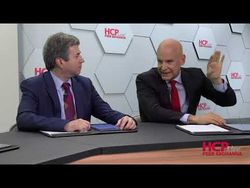Reducing Risk in Cardiovascular Events - Episode 6
Addressing Abnormal HDL Levels
Deepak L. Bhatt, MD, MPH: This has been a great discussion on cholesterol, LDL [low-density lipoprotein] cholesterol, and a little about LP(a) [lipoprotein(a)]. Jamie, maybe we can just say a bit about HDL [high-density lipoprotein]. Again, a lot of primary care physicians are listening. It’s confusing. Some hear HDL is in, then it’s out, then it’s in again. There are all these trials. What’s the bottom line? It’s always been on a lipid panel, so there’s the LDL, the total cholesterol, the triglycerides. We’ll come to that in a bit, but the HDL: pay attention to it or ignore it?
James A. Underberg, MD, MS: I think it’s important to pay attention to it. What I tell my patients is the more I learn about HDL, the less I know. HDL is HDL cholesterol. The cholesterol in HDL or HDL the particle. But the key thing with HDL that a lot of physicians forget to do is when they see an HDL that’s abnormal, whether it’s high or low, they don’t stop to think about why. They look at it as a number, something to plug into a risk factor, rather than understand the complex nature of this and why is the HDL 90 mg/dL? Is it because the patient is drinking, or taking estrogen, or has familial hypercholesterolemia? Why is the HDL 20 mg/dL? Because they’re using androgenic steroids or have multiple myeloma. We try to understand why the HDL is high or low. But then from there, it’s time to move on and focus on LDL and non-HDL cholesterol or APOB. In the future we’re going to have potential interventions that impact HDL on more of a functional nature. But right now it’s just not there.
Deepak L. Bhatt, MD, MPH: Are any of you doing anything fun with HDL these days?
Michael Miller, MD: Well, I will just say that we looked at this in the Framingham Heart Study, and the question we asked was, “How influential is HDL?” You ask if it’s isolated low or isolated high, then you add on other risk factors. We’ve had over the years a number of medical students and residents come to see us just with an isolated low HDL. What does it mean? It turns out that if you have an isolated low HDL but everything else is normal—your LDL is low, your triglycerides are low, you don’t smoke, no blood pressure—your risk is low. It’s not as high as one might have thought. But when you start, add on higher LDL and high triglycerides on top of that low HDL, that magnifies risk. Conversely, a high HDL is protective only when everything is normal. If you have a high HDL and your LDL is low, triglycerides low, you’re protected. If you have a high HDL but you have a high LDL and other risk factors, you lose that protection. That’s kind of a simple way of thinking about it.
Steven E. Nissen, MD: Christie and I and some others here at the table, we’ve spent a lot of energy trying to raise HDL to make people better. And it’s been heartbreaking. I mean, we’ve come up with CETP inhibitors and they didn’t work. We’ve infused HDL in a variety of ways. There are still a few shots on goal left. We’re not optimistic about the ongoing studies. They’re not likely to work out. It has been a very disappointing pathway to take. Maybe Jamie is right. Maybe it’s about HDL functionality, and maybe we can make HDL more functional. But I’m very skeptical. Mike made the point, which is that it’s an important risk factor taken in the context of other risk factors that helps you identify people who are at greater or lesser risk. In my practice, it’s the obesity epidemic that is the primary culprit. Somebody walks in. They say, “How do you diagnose metabolic syndrome?” And I can tell right away. It’s a patient whose waist precedes them into the room when they come into the exam room. They’re probably going to have a low HDL.
Christie M. Ballantyne, MD: For the primary care physician, HDL cholesterol is still a good marker of risk. I don’t know if it’s a risk factor. It’s a marker. And in particular, going back forever, the ratio of total cholesterol, the HDL, which is basically why the equation puts them both in there. That’s really driven by the non-HDL to HDL. That means you have lots of APOB or non-HDL, low HDL. Those people are at increased risk. It is not a targeted therapy at the present time, so it’s a risk marker, useful if someone has a low HDL. As Jamie said, why is it low? Are they at high risk? Do some risk assessment. But the treatment is not the same thing as it is for someone who has a high calcium score. I don’t send them to a chelation center with it.
Deepak L. Bhatt, MD, MPH: Steve’s a big believer in chelation, by the way. He sends patients to it all the time. I’ve been trying to get him to stop, but he just keeps sending them.
James A. Underberg, MD, MS: The other key point that Mike pointed out is that there are patients who come in and have inherited LDL disorders, FH [familial hypercholesterolemia], often women with high HDL who have been told that that’s protecting them. The other take-home message for primary care physicians is that’s not the case, and you shouldn’t not treat someone with a high LDL if their HDL is high.
Michael Miller, MD: We used to think that 20, 30 years ago. That was the standard.
Steven E. Nissen, MD: But how many times do you hear that? Somebody comes in and they said, well, I want your second opinion. My doctor said that I do have a high LDL but that my HDL is really high, so I’m OK. People are still looking at the LDH-HDL ratio and all that.
Deepak L. Bhatt, MD, MPH: It really is persistent, though.
Steven E. Nissen, MD: That is very hard to stamp out. If I can once again emphasize the point that the lifelong area under the LDL curve is a very good predictor of what will happen. If you have a moderately high LDL from childhood on, you have a lot of risk, and that’s a lot of people. I see them. They come in and they’re 45 years old and they’ve never had a cholesterol check, ever. That can’t be good public health practice. I tell people, sometime—maybe by around age 20—get a cholesterol check. And some people are suggesting, I know the pediatricians now are talking about doing this even younger, just once. Because if you can’t pick out those kids who have FH, you can’t have an impact on their practice.
Transcript edited for clarity.



